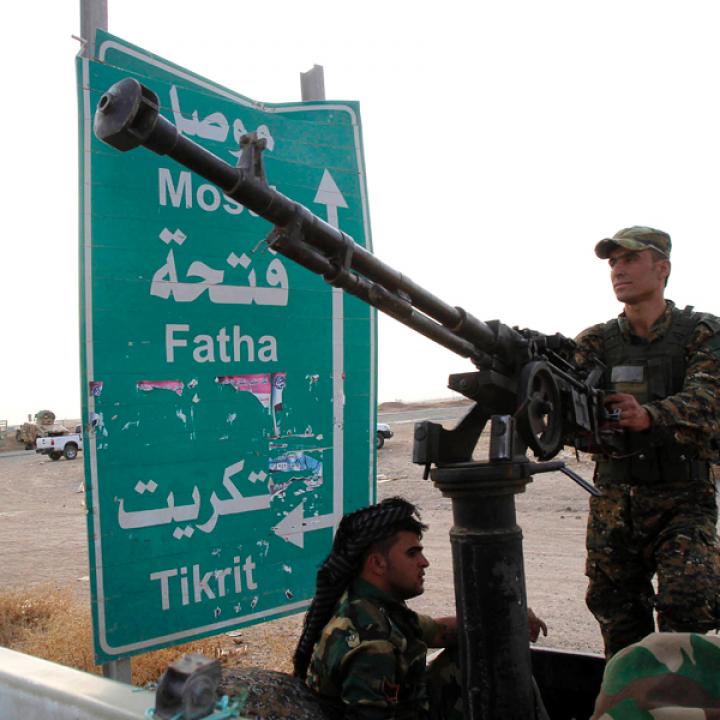

In the coming days, Kirkuk will either explode into open fighting between Kurdish and Iraqi forces or spur a much-needed dialogue between Baghdad and Erbil.
On October 12, the oil-rich Iraqi province of Kirkuk came very close to witnessing a major clash between two U.S.-armed militaries -- the federal Iraqi army and the forces of the Kurdistan Regional Government (KRG). The army has been unable to access its old bases in Kirkuk since its June 2014 collapse at the hands of the Islamic State, and Kurdish Peshmerga have since taken full control of these areas and their oil fields. The recovering federal military has now made its first attempt to reenter the Peshmerga-controlled zone.
Yesterday, a column of army units, special forces, and Popular Mobilization Forces loyal to the moderate cleric Grand Ayatollah Ali al-Sistani advanced over the Kurdish frontline berm south of Kirkuk city, within a fifteen-minute drive of the provincial capital and key oil fields. Local Peshmerga reportedly came very close to firing on these forces, which halted just in time after Iraqi prime minister Haider al-Abadi received a phone call from one Kurdish faction -- the Patriotic Union of Kurdistan (PUK) -- asking for forty-eight hours to confer internally and with the other major Kurdish faction, the Kurdistan Democratic Party (KDP). The clock is now ticking, and the deadline will expire by early Sunday morning local time.
In all likelihood, one of three outcomes will unfold. First, Baghdad's forces could resume their advance after the deadline, then halt or turn back if Peshmerga block them from entering Kirkuk's military bases and oil fields. Second, federal forces could succeed in pushing onto their objectives. Either of these initial scenarios could generate a major crisis. The first would spell political trouble for Abadi and likely spur intensified multilateral sanctions on the Kurds, including border closures with Turkey and Iraq and removal of the KRG's capacity to generate customs and oil revenue. And whether federal forces succeed or fail, blood would be likely be shed during the confrontation, casting a very deep shadow over Abadi's efforts to serve as a unifier in the 2018 elections and further disrupting the military campaign against the Islamic State. Kirkuk's oil fields might be heavily damaged as well.
Fortunately, a third, more attractive option is available. Since the September 25 KRG independence referendum, Baghdad has been unwilling to enter unconditional negotiations with the KRG, requiring Erbil to publicly renounce the vote in some fashion before coming back to the table. Yet the Kirkuk crisis gives Baghdad a clear pretext for direct emergency talks, and without losing face for setting aside its renouncement demand (at least in the short term). These discussions could center on the PUK's proposed compromise: "temporary joint administration" of Kirkuk. The portions of Kirkuk that the PUK controls -- the main air base, the K1 military base, and some energy facilities -- would be good spots to develop a joint security mechanism between federal and Peshmerga forces.
This approach could take some heat out of the crisis, placate Turkish and Iranian fears of growing Kurdish nationalism, and reduce military tensions in Kirkuk. To be sure, further negotiations would be needed regarding the city's KDP-held zone, which includes two large oil fields, Bai Hassan and Avana. But at least the process would be started.
The United States has rightly expressed that it will not allow any actor to take military steps against the Kurds in their three core provinces -- Erbil, Dahuk, and Sulaymaniyah. It has also quietly but insistently signaled Baghdad that any effort to regain access to disputed areas such as Kirkuk should not involve violence, should not be led by Iranian-backed militias, and should leave ample room left for negotiation. Thus far, Abadi seems to have respected these concerns, and the Kurds have likewise been urged to refrain from using force.
Washington should now push for negotiations during the remainder of the forty-eight-hour truce, supporting extensions to the deadline as warranted. Toward that end, it should maintain its small military advisory presence in Kirkuk, which aids situational awareness and crisis communication between the sides.
In particular, U.S. mediators should call for de-escalation measures: a freeze on sending reinforcements to the area, the removal of heavy weapons such as artillery and tanks to a mutual distance, a ban on nighttime movements, and two-way communication to make each side aware of new troop movements. They should also prioritize a partial, incremental solution to the crisis in the near term -- such as the return of limited federal military missions to PUK-controlled sites in Kirkuk -- instead of an expansive "mega deal" that requires the immediate return of large federal forces to all areas surrendered in 2014. These forces are needed for operations elsewhere in the country anyway, and Kirkuk is not yet equipped to give them the necessary housing and logistical support.
U.S. support to small Iraqi military missions in Kirkuk could be the start of a trilateral combined security mechanism for the city, which federal, KRG, and U.S. forces might then extend into other disputed areas. There are many ways to reintroduce federal security forces without requiring the Kurds to welcome back heavily armed military units; for instance, lightly armed federal oil field police are much needed to prevent Islamic State insurgent attacks on key hydrocarbon resources. Above all, Washington needs to act immediately to keep its allies from fighting each other in the coming days, with a focus on measures that encourage incremental progress and confidence building.
Michael Knights, a Lafer Fellow with The Washington Institute, has worked in all of Iraq's provinces and spent time embedded with the country's security forces.



